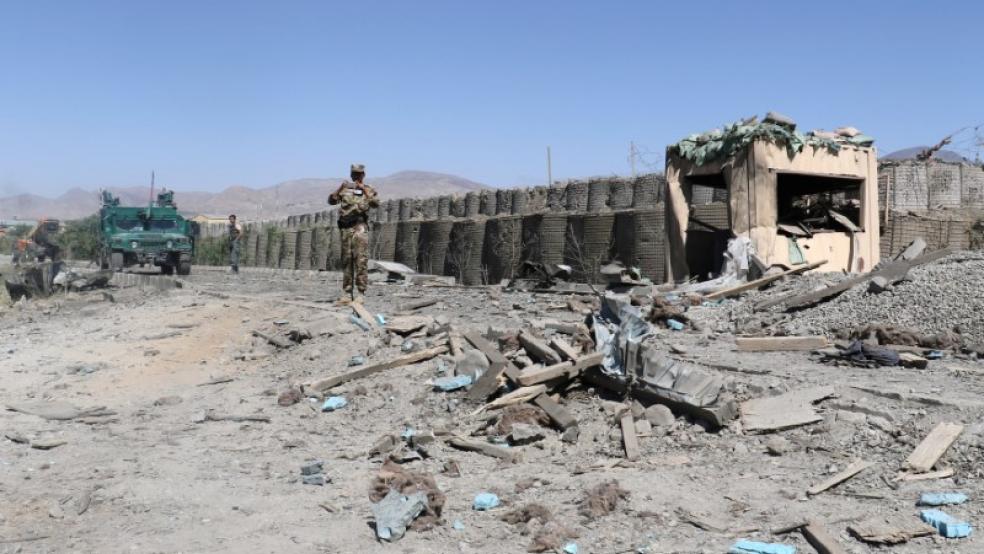Earlier this month, ISIS claimed to have taken Tora Bora, Osama bin Laden’s old hideout in Afghanistan. The Taliban immediately denied ISIS’s claim, insisting that it still held the area. But, in either case, an Afghan region captured by U.S.-aligned forces in 2001 is now under hostile control — despite more than 15 years of continuous American military presence in the country.
The situation in Tora Bora illustrates the futility of America’s Afghan adventure. It is long past time to give up and get out. After spending $1 trillion — and after 2,200 U.S. military deaths and 17,000 wounded — we are still “not winning” in Afghanistan, according to defense Secretary Jim Mattis. His solution is to double down on the failed U.S. strategy by sending in more troops. But we have seen that movie before and it never has a happy ending.
The U.S. is not the first foreign power to try unsuccessfully to subdue Afghanistan by military force. The British made three forays into the county. Their first war ended in 1842, after Afghans massacred retreating British and Indian troops. A second incursion in 1878 was going better until Afghan forces killed Britain’s military envoy in Kabul. British troops evacuated the country in 1881, but left with an agreement to control the nation’s foreign policy. That deal ended with a third Anglo-Afghan War in 1919, shortly after which Afghanistan tilted toward the Soviet Union.
In the late 1970s, a mujahedeen insurgency destabilized the nation’s pro-Soviet government, triggering a Soviet invasion. Throughout most of the 1980s, Soviet occupiers controlled urban areas, but mujahedeen fighters roamed freely around the countryside, combatting occupation troops with U.S. backing. (Ultimately these U.S. allies would morph into our enemies by supporting the Taliban and al Qaeda). After over nine years and 15,000 war dead, Soviet forces evacuated the country.
Unfortunately, President George W. Bush ignored this history when he chose to invade and occupy Afghanistan in 2001. Although some response to the 9/11 attack was needed, special forces raids targeted against bin Laden and other key al Qaeda and Taliban leaders would have been far more cost effective than the regime change strategy Bush pursued. The U.S. imposed and propped up a corrupt government under Hamid Karzai — a regime that required massive election fraud to retain power. Worse, neither President Obama nor President Trump (thus far) saw fit to reverse Bush’s failed strategy.
Despite spending billions on aid to the poor nation, there is little evidence that the U.S. has won hearts and minds in Afghanistan. One problem is that most of the aid money is stolen or wasted by government officials and contractors, providing little benefit to the general population.
Any leftover goodwill is offset by the many civilian deaths and injuries caused by the U.S. military. For example, a 2015 U.S. gunship attack destroyed a Doctors Without Borders hospital, killing 42 people. While this incident and many others like it are explained as mistakes, Staff Sergeant Robert Bale’s pre-meditated massacre of 16 Afghan villagers cannot be so easily rationalized. This deliberate killing is not unique: In 2010, a group of American soldiers formed a “kill team” for the purpose of hunting Afghan civilians, ultimately murdering three.
The fact that the U.S. military categorizes a “collateral damage incident” as an accident is unlikely to elicit much forgiveness from Afghanis. Since Afghanis do not get their news from U.S. media outlets and are naturally less likely to believe in American exceptionalism, perhaps they can be forgiven for taking a more jaundiced view of U.S. attacks on civilians. Further, should we really be surprised if today’s Afghan children witnessing the deaths of their relatives at American hands become the Taliban fighters — or even the ISIS terrorists — of tomorrow?
If our ongoing occupation of Afghanistan is so costly and unproductive, why stay there? Administration officials are likely worried about the political costs of withdrawing. War hawks like Sens. John McCain and Lindsay Graham would undoubtedly blame anything that subsequently goes wrong in Afghanistan on a “too hasty” withdrawal. This would mirror their criticism of Obama pulling out of Iraq and thus allegedly creating the opportunity for ISIS. But, as we’ve seen, the presence of U.S. forces in Afghanistan has not prevented hostile forces from taking territory — including the caves of Tora Bora.
The implication of McCain and Graham’s position is that we must maintain combat forces in any country that has active jihadist forces. Unfortunately, there are dozens of such countries in the Middle East, sub-Saharan Africa and Southeast Asia. We already have troops in several of these nations and are conducting special forces raids in a number of others.
Forward deployments have not prevented ongoing terrorist attacks in the West, and actually inspire them in some cases. One of the terrorists who took over a Paris Kosher deli in 2015 (killing four) invoked French military action in Syria and Mali as a justification for his attack. The terrorist, Amedy Coulibaly, was born in France and converted to Islam.
Another argument for continued occupation relies on fallacious “sunk cost” thinking. Withdrawal is impossible, the argument goes, because it will mean the lives and other resources devoted to the occupation thus far will have been wasted. But as one learns in a basic Economics class, that sort of thinking is irrational. Individuals and policymakers should make decisions based on present and future costs and benefits; what happened in the past cannot be changed. Sacrificing additional troops on the altar of previous deaths is not only irrational, it is immoral. If our leaders know that the task at hand is hopeless, they have no right to ask any more soldiers to give up their lives and families to lose their loved ones.
From a fiscal perspective, it is hard to justify staying in Afghanistan at an annual cost in the tens of billions of dollars, when our country has a $20 trillion national debt and faces a wall of Baby Boomer retirement obligations. While it may be that Social Security and Medicare benefits have to be reduced, we shouldn’t be asking seniors to skip meals and medical appointments so that politicians can waste more money on an Afghan occupation that should have ended years ago.






